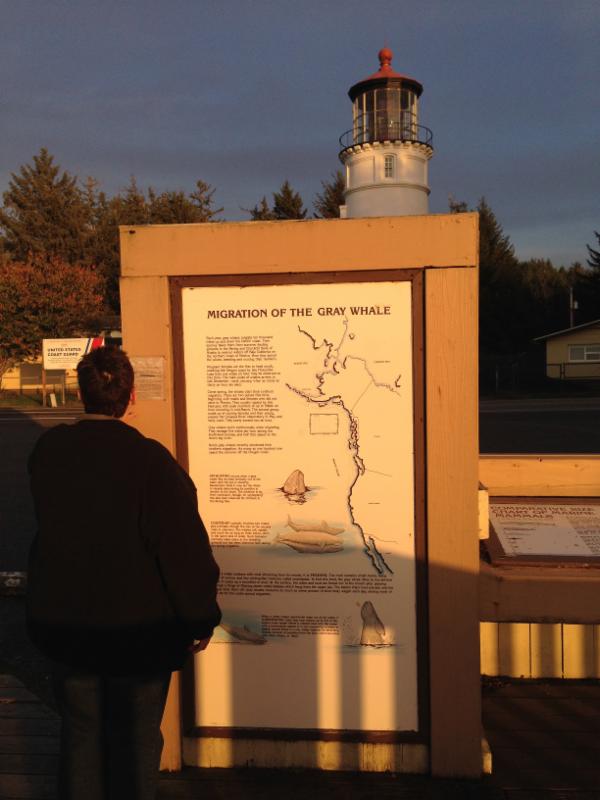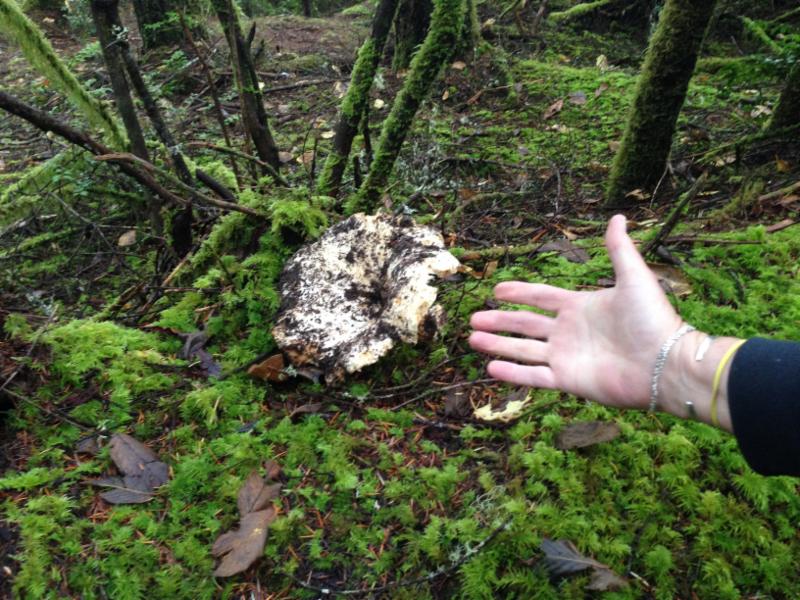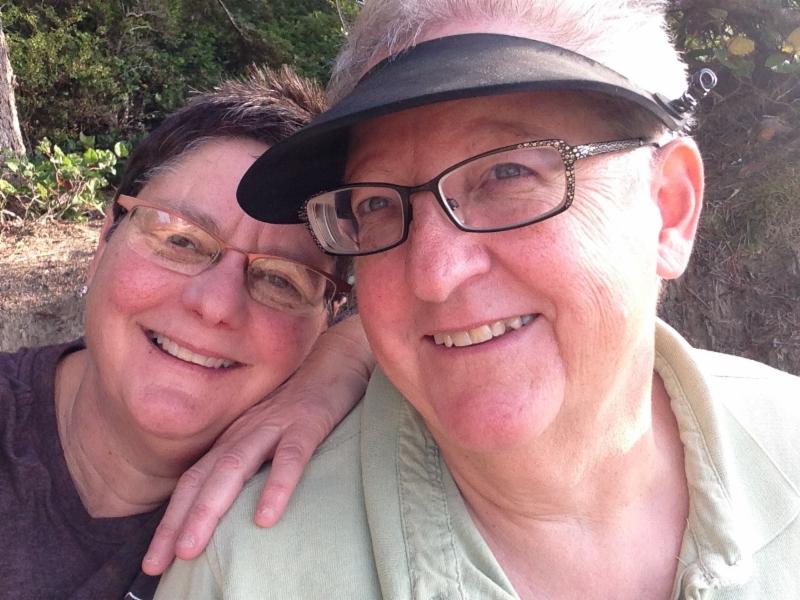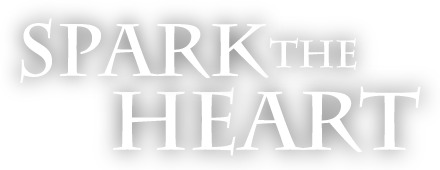It’s hard to believe that we’ve been on the road, living this life, for seven months. Each experience seems to open us up just a little more, to who we are, what we love, and how we can serve.
We really loved our time working at the Cape Blanco Lighthouse last month, meeting people from all over the world, sharing the specialness of the oldest continuously operating lighthouse on the Oregon coast. And we realized how much we enjoy having a schedule, being of service, and staying in one place for a month to settle in, spread out, explore the area.
This month our volunteering has us cleaning yurts at the Umpqua River Lighthouse Campground in Reedsport, Oregon. The deluxe yurts are octagons, twenty four feet in diameter, with wooden floors and thick, vinyl fabric that has been stretched over an exposed wooden frame to create a sturdy, weatherproof shelter. Each yurt has two queen futon sofa beds and a three-person bunk bed, built-in shelves, and a coffee table. There is a kitchenette with a fridge and microwave, a large bathroom with a shower, DVD player, skylight, ceiling fan, an outdoor grill, and a covered deck. They rent for $80.00 a night and guests provide their own linens, toiletries, food, and coffee machine.

While Lighthouse Hosting required more energy connecting with people and sharing information, yurt cleaning work is more physical – sweeping, mopping, wiping down surfaces. And we are enjoying it. The biggest perk of the job is that I get to drive a golf cart from our campsite to the yurts. This may not seem like a big deal, but driving a golf cart has been on my bucket list for years! And so, every morning, it is sheer delight to show up for work and tool around in our electric cart.
We pick up our schedule in the office to find out which two or three of the six deluxe yurts we’ll be cleaning that day. Then we drive down to the yurt village to get our supplies from the chase, the cleaning closet that holds our brooms, mops, rags, trash bags, and bottles of spray cleaners. We load up our cart and, as soon as a yurt key is turned in, we are ready to clean.
After we unload our supplies onto the deck, I go inside, turn on the lights, turn down the thermostat, check the fridge temperature and open the skylight. Then I head outside to sweep the deck and the door mat, clean the BBQ if it was used, and remove any spiders and cobwebs around the outside of the yurt. Meanwhile Marika is inside spraying disinfectant on every surface that a person might have touched.
When she has moved into the bathroom, I put on a surgical mask to minimize breathing in the chemicals, and start wiping down everything she has sprayed. I use the yellow string mop on the vinyl covered futon mattresses and a rag on everything else. I use the fuzzy brush on an extended pole to wipe any cobwebs on the inside walls and ceilings, and put new plastic bags in the trash cans. I close the skylight, sweep the floor, put the key in the lock box for the next guest, then wait out on the deck while Marika washes the floor behind me. It takes forty five minutes to an hour, at a slow, easy pace. And then we take a break.
This pace is very different from running a business. I am learning that I don’t have to rush, or multi-task; that part of the four-hour workday includes chatting with the other hosts, checking my email, taking a break on the yurt deck to enjoy the view of Lake Marie.

After our yurt cleaning, we do litter-pick up and bathroom restocking, either at the day use area, or in the campground. I like that activity too, because we walk around. We each take a plastic gallon bucket and a litter-picker-upper grabber and go in opposite directions.
At the day use, Marika checks the picnic tables and fire pits in the grassy area near the bathrooms, and I take the path to the trail around Lake Marie. I don’t do the full mile loop, just the section with picnic tables, and where people fish along the shoreline. I scan for trash along the sandy beach and under the shrubbery. Sometimes I find fishing filament, balled up and stuck on a branch. Sometimes there are cigarette butts and empty snack bags. But mostly, it is clean and litter-free.
Yesterday a kayaker was in the lake and asked if I was a volunteer. Yes, indeed, I said. He thanked me, and then said he had found a bobber to throw away, so he paddled to the shore and I walked into the water because I had my rubber boots on, and he dropped it in my bucket.
“There’s some trash down along there,” he said, pointing just a few yards down the bank. “I can show you.” I hiked back up to the path and he guided me to a prime fishing spot. He pointed with his wooden paddle. “Over there, just under that branch.” I plucked a white paper bag and a very brown banana peel and thanked him for his help.
When I get back to the golf cart, I tell Marika the story and how fun it would be to get out the kayak and do our own lake shore cleanup, but she is not ready to commit. We drive to the dumpster with our trash, then return the golf cart to the garage and walk across the parking lot to home.
Our campsite is not in the campground with the other hosts. Instead, we are up the road with the Park Rangers’ office and shop, next to the hosts only laundry room. I love the quiet and privacy. We have lots of dog romping room, and green grass on the other side of the black top that leads to the office. We can see some open sky, but mostly we are surrounded by a forest of thick-trunked evergreens standing more than a hundred feet tall. After the rangers leave for the day, we have the place completely to ourselves.
Just down the main road, past the day use area and around the corner, is the ocean, the Umpqua River, Winchester Bay, a whale watching wayside, and the Umpqua River Lighthouse.

Last Saturday, after a yurt cleaning shift, we drove down to the Lighthouse, hoping to take a tour. The official tour season ended in October, but the gift shop is still open and there is a sign promoting weekend tours.
The woman in the gift shop explained that she needed more than two people to give a tour. We shared that we had been hosts at Cape Blanco and were hoping to see how this lighthouse compared. Next thing you know, she was asking if we wanted to be Lighthouse Tour hosts in December, because she was finally leaving the job after working there for the last seven months, seven days a week.
We had been planning to head south to the Salton Sea in southern California after yurt cleaning, where the weather is drier and warmer, and where there are thousands of migrating birds. But this was an opportunity to share a lighthouse that might close for the season if they didn’t get volunteers. So we took the application and told her we’d think about it.
On the drive home we talked about the pros and cons. It is very wet on the Oregon Coast in the winter, and December is probably going to be even rainier. Nothing dries in the RV, and the dog towels stink. And there are very few birds for Marika to enjoy. But it’s a lighthouse! And we’d be learning new stuff, meeting fun people, and keeping the Lighthouse alive for another month.
And, as wet as it is, I much prefer this weather to the parched desert. I love being able to take a walk in the rain now that I have waterproof shoes, a waterproof jacket and rain pants. And the 55° days are, surprisingly, not too cold for Marika. Her knees are bothering her more in the dampness, but she said that wasn’t enough of a reason to say no.
The next day we looked at the campsite we’d be in, level and grassy, overlooking the Oregon National Dunes, with a spectacular 180° view of the ocean, the river and soon, whales, on a clear day. It’s also a prime winter storm watching spot, another thing that’s been on my bucket list since our first visit here 19 years ago. And, in addition to the usual full hookups of electricity, water and sewage, we’d also have cable TV and wifi, which are a big deal for us. I was ready to say yes, but Marika was still 50/50. She just didn’t like constantly feeling damp.
We stopped into the local RV parts store looking for a new kind of sewage chemical. The owner was a native and we asked her about the rain in December. She said, just get a de-humidifier and a radiant heater, and it’ll keep everything dry inside, and comfortable.
We had three beautiful days of clear, dry skies, and even some sun, and everything dried out. We took the dogs down to the beach below the lighthouse for a leash-free romp along the south jetty. We enjoyed a campfire in the middle of the afternoon, another first for me. And we researched de-humidifiers and radiant heaters.
When I asked Marika when she’d be deciding, she said, “Well, if we’re buying all of this wet weather equipment and waterproof clothing, we might as well use them longer.” She also announced that she was finally going to order the outdoor propane fire pit that she’s been eyeing for months.
The next day we went over to the Lighthouse to sign our volunteer papers and get our tour scripts to start learning. We met our future co-hosts, an older couple who thought they were just going to be caretakers over the winter, but were eager to take on giving tours as well. They had just started the day before, had already memorized most of the script, and were happy to give us a tour.
The Umpqua River Lighthouse is gorgeous. The Fresnel lens inside is one of only two in the world that you can actually climb into. And its signature light is white and red. At night, the light dances around the circle of trees in amoeba-like shapes and it is absolute mesmerizing. We can’t wait to share the beauty with visitors.
We’ll be here at the State Park cleaning yurts through the end of November, then we move to our new spot around the corner on Douglas County property December 1 to begin our month of Lighthouse hosting.
We still plan to head south to the Salton Sea in January for some sun and birds and kayaking. We’re not sure how long we’ll be there, but we’re expecting to spend the month of March in Phoenix. That’s as much as I know for now. And that feels pretty OK.
Because without fretting about the far future, I’m able to really embrace where we are, right here, right now. My lungs feel expansive, my skin stays moist without body lotion, and I love walking in the forest. It’s like a fairyland of lush and green, glistening with raindrops and mushrooms that are bigger than my hand. The trails are covered with thick layers of soggy leaves and pine needles, and all around there are fallen trees, some more than a foot in diameter, carpeted in soft, iridescent moss. I’ve learned to drape my rain jacket over them when I need a dry place to sit.

We finally put the RV awning down, the first time since we’ve been on the road, and Marika arranged our chairs around the new propane fire pit. We sat there as the rain started falling, grinning and dry, happy-grateful for it all.

